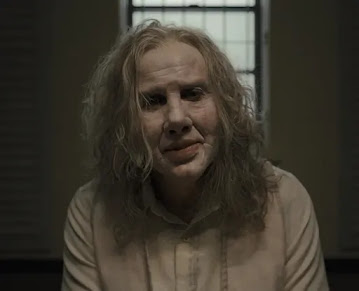Seen from a distance, Longlegs plays less like an occult mystery than a study in damage management – an account of what happens when a family chooses concealment over truth and then constructs an entire life around that decision. I watched it at the Bayers Lake theatre in Halifax, on a date. The seats were close, the room unusually still, and the film’s low-volume intensity rendered ordinary human sounds faintly intrusive. It was an atmosphere well suited to a story in which nothing announces itself and nearly everything essential is deferred.
The film presents itself as a 1990s FBI procedural. Lee Harker, played by Maika Monroe, is assigned to a series of murder–suicides in rural Oregon: fathers killing their families shortly before their daughters’ ninth birthdays, leaving behind letters signed “Longlegs,” written in a hand belonging to no one in the house. The structure implies an external threat – a serial killer, perhaps an occult intelligence – but the film gradually redirects attention inward. Patterns accrue: the birthdays, the dates arranging themselves into shapes on calendars, the dolls delivered to each home. These elements do not function as clues in the usual sense. They do not propel the investigation forward so much as orient it backward, toward something already decided.
Nicolas Cage’s Longlegs is framed as the villain, yet in practice he operates less as an agent than as a facilitator. He commits none of the murders himself. He establishes conditions, distributes instruments, and relies on others – most often parents – to complete the work. His arrest and suicide offer no real closure because he was never the center of the system. He was one of its parts.
The film’s true gravity lies with Lee’s mother, Ruth. Her efforts to “protect” her daughter emerge as the organizing principle behind the entire case. Years earlier, when Longlegs threatened Lee as a child, Ruth agreed to cooperate in exchange for her daughter’s life. From that moment on, she helped deliver the dolls that enabled the killings, while also suppressing Lee’s memory of these events so that she could grow up competent, functional, and unaware. The film does not frame this as insanity but as a sustained, catastrophic choice: truth deferred in the name of survival.
That deferral leaves its mark. Lee’s intuition, her emotional remove, her difficulty locating herself in her own past – all register as side effects of a life built atop omission. When the truth finally surfaces, it arrives not as revelation but as something long overdue. The final attempt to stop the cycle succeeds only in part. One child is saved, but the mechanism remains intact. The doll cannot be destroyed. The damage is contained, not undone.
What Longlegs ultimately portrays is horror that originates within the family rather than outside it. The threat is not invasion but inheritance. Violence passes quietly through care, obedience, and secrecy. When the credits rolled and we stood to leave, the story felt complete yet unresolved, which seems deliberate. Outside, the parking-lot lights were already on, the city proceeding as usual. My date leaned toward me – something ordinary continuing without interruption. The film does not deny the possibility of normal life. It insists only on the price at which it is sometimes preserved.




No comments:
Post a Comment